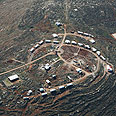
Official figures show spike in settlement construction
Central Bureau of Statistics' document detailing overall construction starts reveals West Bank building at highest relative spike since last year compared to other regions
A document on housing starts released by the Central Bureau of Statistics showed that building in the West Bank jumped from 313 housing starts between January and March last year to 865 the same period this year.
Related stories:
- Palestinians lay groundwork for future state
- Kerry: Last chance for Israel-PA peace
- Fayyad: Palestinian story is one of failed leadership
The statistics bureau's report detailed housing starts country-wide. The West Bank housing represents the highest relative spike since last year compared to other regions in Israel, but it made up the smallest portion of new building compared to overall construction around the country.
The report, released at the end of May, comes days before Kerry is set to arrive to Israel in his bid to persuade both sides to return to negotiations. Kerry has been shuttling between the sides in recent months in hopes of finding a formula to restart negotiations. He is expected in the region this week on what would be his fifth visit since becoming secretary of state early this year.
"It's clear not only to us Palestinians but also to the American administration and John Kerry that the current Israeli government is not interested in the peace process," said Nimr Hamad, an adviser to Palestinian President Mahmoud Abbas .
"The Palestinian position is clear. Israel has to be forced to stop the settlement activity."
An Israeli government official said the housing starts were in response to the Palestinian move last year to seek state recognition at the United Nations. The official spoke on condition of anonymity because he was not authorized to speak to reporters.
On Sunday, Yedioth Ahronoth obtained a document detailing the planned Palestinian construction projects that are part of the "Fayyad Plan," a template for a de facto Palestinian statehood.
The majority of the projects are in the Israel-controlled Area C, and many of them have already begun. Some are awaiting the approval of the Civil Administration, the Israeli governing body that operates in the West Bank.
Six cities, two airports, a high-tech complex, a university and a system of highways to connect all of the above are included in the new Palestinian construction plan aimed at setting facts on the ground and creating a territorial continuity in the West Bank.
The construction is premised on a Palestinian refusal to wait for the revival of peace talks, promting them to independently lay down the foundations and infrastructure for an independent state.
Also on Sunday, a senior Israeli official said that the ruling Likud Party will not accept a Palestinian state with the 1967 borders favored by Palestinians and the international community, presenting a new hurdle to Kerry's effort to restart peace talks.
Prime Minister Benjamin Netanyahu moved to distance himself from the comments by his deputy defense minister, Danny Danon.
In a TV interview, Danon said "there is certainly no majority" in the Likud for establishing a Palestinian state based on Israel's borders before the 1967 Six Day Way.
"A Palestinian state on the 1967 lines is something dangerous for Israel, and therefore I oppose that idea," Danon said, adding it was possible that the broader coalition government, which includes other hard-line parties, also oppose a return to the 1967 lines.
Officials in Netanyahu's office said that Danon had stated a personal opinion, and his comments did not reflect government policy.
In a veiled reference to Danon, Netanyahu told his Cabinet on Sunday "the government must function as one unit" in order to confront the many challenges facing the country.
The Syrian example
Netanyahu linked the recent troubles along Israel's front with Syria to the Palestinian issue, telling his Cabinet that the planned withdrawal of Austrian peacekeepers from the Golan Heights shows that Israel cannot rely on others to protect its security.
Austria announced the pullout from a UN peacekeeping force along the Israeli-Syrian frontier after rebels briefly overran a border crossing.
The incident "underscores the fact that Israel cannot depend on international forces for its security," Netanyahu said. "They can be part of the arrangements. They cannot be the basic foundation of Israel's security."
Israel's chief negotiator with the Palestinians, Tzipi Livni, said Sunday that she is working with the US to restart talks, despite those within the government that oppose it.
"It is true that within the Likud there are radical elements and within the government there are those that oppose an agreement," Livni told Israel Radio.
"The prime minister is the one who will have to decide whether he surrenders to radical elements or will promote his policy that he declared," she said.
Livni said Danon's comments "look bad."
The top Palestinian negotiator, Saeb Erekat, said Danon's remarks reflect Israel's policy. "I believe that a government that continues to tender settlements and rejects the two state solution will not go for peace," he said.
- Receive Ynetnews updates directly to your desktop










